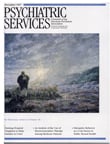A Randomized Controlled Study of the Effectiveness of Intensive Outpatient Treatment for Cocaine Dependence
Abstract
OBJECTIVE: A randomized controlled study design was used to compare the effectiveness of intensive outpatient treatment with individual outpatient counseling and a combination of individual and group outpatient counseling for cocaine-dependent patients. METHODS: Volunteers for this study were recruited from among first admissions to an inner-city, public-sector outpatient substance abuse clinic. In-treatment, end-of-treatment, and nine-month follow-up assessments were compared for participants randomly assigned for 12 weeks to one of three treatment modalities—weekly individual outpatient counseling, weekly individual counseling plus one weekly group session, or a newly designed intensive group treatment program consisting of three hours of group treatment three days a week. Results and conclusions: Patients who completed the intensive program showed significant improvement from intake to end-of-treatment scores on the Addiction Severity Index, the Beck Depression Inventory, and the Symptom Checklist. At nine-month follow-up, patients who had remained in treatment longer had fewer drug problems, a smaller proportion of positive urine drug screening tests, a better employment status, and fewer psychological problems compared with patients who left treatment earlier. Patients who remained in treatment were also more likely to be attending self-help meetings, continuing in outpatient treatment, or attending school. However, for the 447 patients randomly assigned to the three conditions, there were no significant differences between treatment modalities on any of the variables at nine-month follow-up. The new intensive treatment program was not shown to be superior to more traditional treatment programs.



